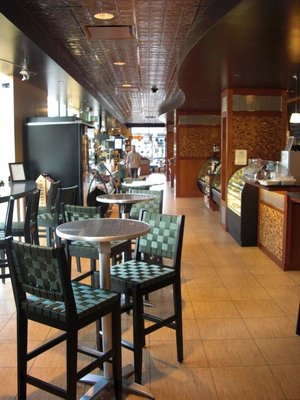 Article written by Ellen Lipo, OPRF HS Environmental Club based on an Interview with Marion Street Cheese Market Executive Chef, Leonard Hollander
In March, the Marion Street Cheese Market, located at 100 S. Marion Street in Oak Park, became a green-certified restaurant, receiving three out of four stars from the Green Restaurant Association. It is the only green-certified restaurant in Oak Park, and one of only a handful in the Chicago area. The rating is based on 60-70 categories, ranging from floor tile to composting. The rating given then translates to a number of stars.
Article written by Ellen Lipo, OPRF HS Environmental Club based on an Interview with Marion Street Cheese Market Executive Chef, Leonard Hollander
In March, the Marion Street Cheese Market, located at 100 S. Marion Street in Oak Park, became a green-certified restaurant, receiving three out of four stars from the Green Restaurant Association. It is the only green-certified restaurant in Oak Park, and one of only a handful in the Chicago area. The rating is based on 60-70 categories, ranging from floor tile to composting. The rating given then translates to a number of stars.
One of the people responsible for achieving the level of sustainability that led to the certification is Leonard Hollander, the Cheese Market’s Executive Chef. Mr. Hollander has worked at Marion Street Cheese Market for two years, and together with the owners, Eric Larson and Mary Jo Schuler, has helped create and maintain a green vision for the business. He said that the vision of having a restaurant that operates in as sustainable a manner as possible is something he shares with the owners, and they have since entrusted him to handle many of the food sourcing decisions and day-to-day supply issues of the restaurant.
Prior to Mr. Hollander, the chefs at Marion Street Cheese Market bought produce and other ingredients at local farmers’ markets, but also on occasion from large agribusiness companies. As part of his responsibility for all food procurement and waste management, Mr. Hollander now works with organizations such as the Chicago Resource Center and City Farm to buy fresh produce. Recently he received the first produce from City Farm that was grown from soil made from the Cheese Market’s own compost.
In addition to that unique produce, the restaurant also purchases from various local farms and organic distributors, for instance, buying milk from Kilgus Creamery in southern Illinois, which Mr Hollander believes “tastes like milk ... unlike the soulless variety found at 7-11 and Jewel”. Mr. Hollander also works with companies like Testa Produce, Natural Direct, and Organic Valley. The restaurant is local even down to its coffee syrups.
Mr. Hollander says he is most proud of “our ability to produce the food at the quality we do, for a dining room of this size, from the kitchen we have.” Because of building constraints (the restaurant is located in a residential building) the kitchen does not have access to gas, and only has two electric burners and an electric fryer. “First and foremost, my job is to take ingredients and turn them into delicious things,” he said. “If it’s local and sustainable…but doesn’t taste good, what’s the point?” He asserts that his green-sourced ingredients definitely translate to the food, saying he knows a lot of people who find their cheese, meat and fish only at Marion Street Cheese Market, and nowhere else.
The Cheese Market also incorporates green measures in other areas of the restaurant: the chairs are made from recycled car seat belts, bar counters are built with recycled glass, and sustainable wood is integrated throughout the building. The restaurant serves smaller portion sizes. “We decreased our waste massively by following that one point, mitigating portion sizes,” Hollander said. This leaves diners room for dessert, he said, (which doesn’t hurt our business, either).
One of his biggest challenges is making green affordable. “We definitely don’t make as much money as we could because we’ve chosen to do things the way we do” (in a way as sustainable and sensitive to the environment as we can).
Mr. Hollander’s advice to other restaurants looking to go green is to “Learn what it means. So few people really know what it means, and I have a little bit of fear about that.” Restaurants have to constantly keep finding a new angle on being green. “People don’t look at it as something you can quantify,” Hollander said, but as more of a feeling. But being green and sustainable can be quantified, as evidenced by the Marion Street Cheese Market.
Related posts and articles:

